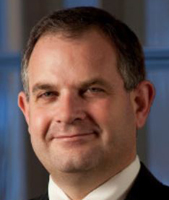Less Cumbersome Trials Will Reduce Clinical Costs & Timelines

By Ed Miseta, Chief Editor, Clinical Leader

The 2019 CNS Summit will kick off on October 31, 2019 and feature four days of sessions that are enlightening and inspiring, as well as unparalleled networking opportunities. This is the 10th anniversary of the Summit, which brings together thought leaders and innovators from sponsor companies, government, and solutions providers to collaborate and drive the success of future clinical development programs. With spotlight sessions focusing on artificial intelligence, digital therapeutics, real-world evidence, decentralized trials, putting the patient first, and more, this promises to be an event you don’t want to miss.
One of this year’s presenters is Antony Loebel, M.D., president and Chief Executive Officer for Sunovion Pharmaceuticals Inc. In this Q&A, Loebel discusses the clinical challenges facing the industry, patient centricity, and how we can expect healthcare and drug development to change over the next ten years.
Ed Miseta: What topics will you be addressing in your session at CNS Summit?
 Antony Loebel: During the CNS Summit, I will have the opportunity to have a fireside chat with Amir Kalali, Chief Curator and Program Chair of the CNS Summit, during which I’ll reflect on the 10-year anniversary of this meeting. Amir has brought together stakeholders across the CNS drug development enterprise in a collaborative way to focus on advancing CNS innovation for the benefit of patients. I also expect to discuss my transition to the role of president and CEO of Sunovion and how we continue to advance CNS therapeutics in an era of rapid change.
Antony Loebel: During the CNS Summit, I will have the opportunity to have a fireside chat with Amir Kalali, Chief Curator and Program Chair of the CNS Summit, during which I’ll reflect on the 10-year anniversary of this meeting. Amir has brought together stakeholders across the CNS drug development enterprise in a collaborative way to focus on advancing CNS innovation for the benefit of patients. I also expect to discuss my transition to the role of president and CEO of Sunovion and how we continue to advance CNS therapeutics in an era of rapid change.
Miseta: What are the biggest clinical challenges facing the industry going forward?
Loebel: Over 10 years CNS drug development has waxed and waned. Many companies exited the CNS development space due to perceived high risks and a number of failed programs. At Sunovion, we have continued to invest in the CNS area and have successfully developed and commercialized a number of products in this space. There remains a great need for new and innovative medicines and a need for investment to advance the field. The industry needs to find ways to take advantage of rapidly emerging scientific understanding and focus on collaborative and innovative solutions for global health problems.
Miseta: Is the industry making any progress in getting the patient voice more involved in trial design?
Loebel: A lot of progress has been made in ensuring that we meet the needs of people living with the serious health conditions we aim to treat. There is significant complexity in balancing the needs of the various stakeholders involved, but the patient’s voice must always come first as we consider how to collectively move forward.
Miseta: In terms of health care and drug development, what do you predict to be the biggest changes in 10 years’ time compared to now?
Loebel: I see a continued shift from the routine use of large, cumbersome clinical trials to a more varied palette of studies that can provide needed answers in a less costly manner and with shorter timeframes. Digital health advancements and more virtual, decentralized trials for example will help generate data in a manner that should allow us to do more with less.
